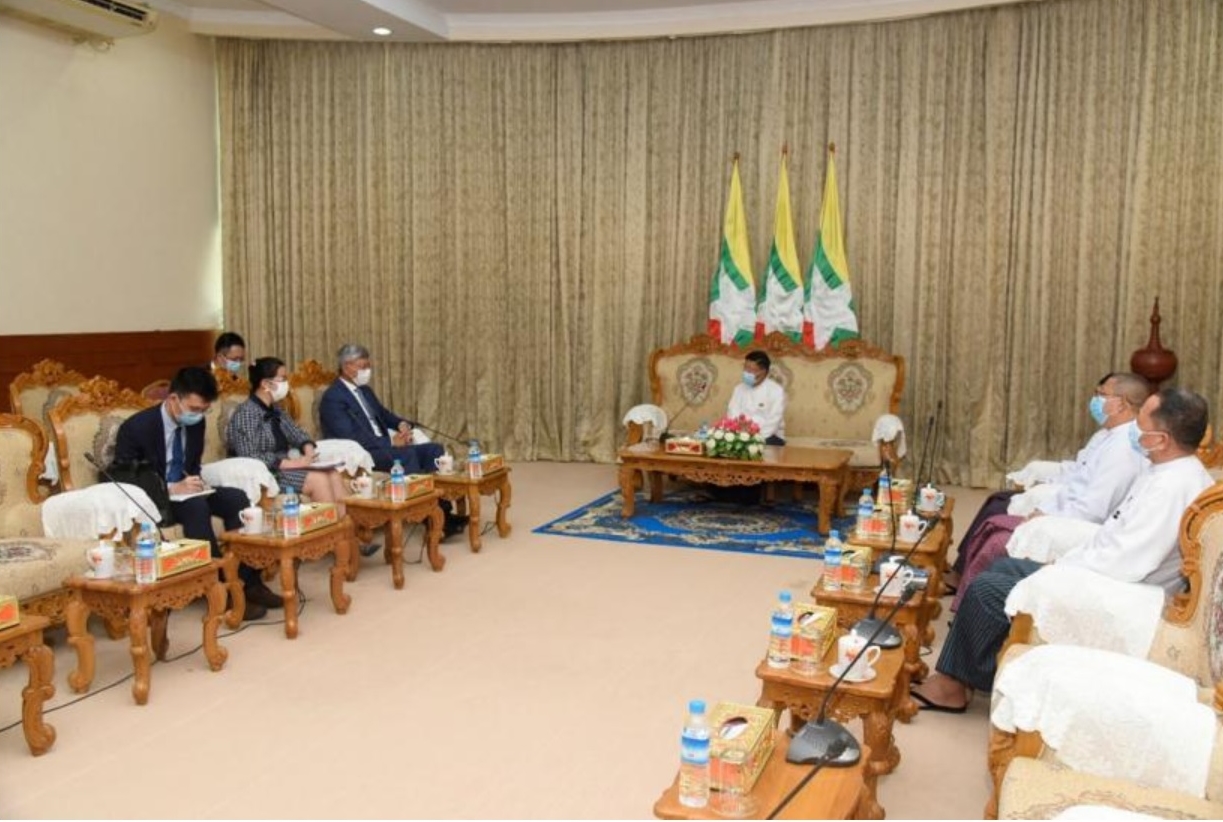A recent meeting of China and India’s ambassadors with Myanmar’s junta-appointed electoral body has raised concerns that the two neighboring countries are offering additional disguised support to the military regime.
Chen Hai, China’s ambassador to Myanmar, and Vinya Kumar, India’s ambassador to Myanmar, held separate meetings with Union Election Commission (UEC) head U Thein Soe on April 19 and 25 respectively to discuss the military regime’s planned new election, according to junta-controlled media.
During the meetings, the ambassadors revealed their interest in the electoral processes of the new election, which are said to have been overseen by coup leader Senior General Min Aung Hlaing.
The Myanmar military staged last year’s coup on the pretext of “massive electoral fraud” in the 2020 general election won overwhelmingly by the National League for Democracy (NLD).
Army chief Min Aung Hlaing’s flimsy justification for the military takeover was condemned at home and abroad, and sparked nationwide peaceful protests against the coup that were put down brutally by the junta. Since then, a growing resistance movement has waged armed struggle against the regime.
Soon after the February 1, 2021 coup, Min Aung Hlaing annulled the 2020 general election results, and said that he would organize a “free and fair” election sometime in 2023 and hand over power to the winning party. However, the Myanmar people have rejected the offer of a new poll, seeing it as another excuse by the regime to hang onto power for as long as possible.
Junta-controlled newspapers stated that during his meeting with the UEC head, India’s ambassador asked about electoral processes and discussed further cooperation with the UEC on the upcoming election. The Chinese ambassador raised questions on the ongoing plans of the UEC, including inspections of political parties ahead of the planned 2023 election.

The meetings come amid repeated calls by the Myanmar people for neighboring countries and the international community to reject the junta, and respect the results of the 2020 election.
China and India’s meetings with the UEC cast more doubt on their attitude towards the regime, with neither country having condemned the coup outright and both continuing to maintain good ties with the junta that has killed over 1,700 people since the military takeover.
Political analyst U Than Soe Naing said that while China’s engagement with the regime is not new, India’s interest in the junta’s planned election is strange.
“I would take it as a step forward [by India] in supporting the regime,” he said.
New Delhi has steered clear of criticizing the Myanmar military and the coup. In fact, hours after the putsch, India’s Ministry of External Affairs said only that it had “noted the developments in Myanmar with deep concern”.
India was also one of eight countries that sent their military attachés to attend the Armed Forces Day parade in the Myanmar capital Naypyitaw on March 27, 2021, less than two months after the coup. India has deep ties with the Myanmar military, as well as extensive strategic investment interests in western Myanmar.
China has been seriously denounced in Myanmar for its failure to condemn the coup and for vetoing United Nations Security Council action against the regime.
While the junta is treated as an outcast by most western democracies, China, like India, is still engaging with the junta and is one of the top investors in Myanmar with many strategic infrastructure projects, including energy pipelines and a proposed port in Rakhine State that would give China access to the Indian Ocean. China said recently that it was ready to work with Myanmar “no matter how the situation changes”. Following that affirmation, Beijing has faced threats of attacks from resistance forces on its copper mine projects in Myanmar.
Analyst U Than Soe Naing reminded China and India that the junta’s planned new election won’t be free and fair even if the regime makes it happen, as it is opposed by a majority of the Myanmar people.
“It would just become a state-sponsored fabrication plotted by the junta and its allied parties who have never won in any free and fair elections in Myanmar,” said U Than Soe Naing, referring to parties like the military’s proxy Union Solidarity and Development Party.
He suggested that neighboring countries should engage with the parallel National Unity Government (NUG), which the majority of Myanmar people have accepted as their legitimate government, adding that they [China and India] will go against the people’s will if they continue to collaborate with the regime.
The NUG’s foreign minister Daw Zin Mar Aung told The Irrawaddy recently that some countries, like the world’s largest democracy India, are strong but are too focused on their interests and so fail to act decisively.
“We record who our friends are and who is sitting on the fence, which will shape our future relations with them,” said Daw Zin Mar Aung.
China and India’s embassies in Yangon did not respond to The Irrawaddy’s request for comment.
You may also like these stories:
Pregnant Woman Miscarries, 4 Detained as Myanmar Regime Cracks Down on ‘Six Twos’ Protest
Myanmar Junta Asks UN’s Top Court to Drop Rohingya Genocide Case at Hearing in The Hague
Cobra Gold Military Exercise Kicks Off in Thailand Without Myanmar

















